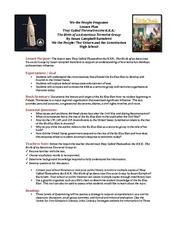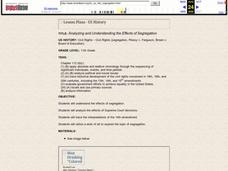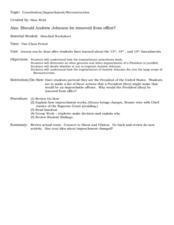Curated OER
What are the 13th,14th, and 15th Amendments?
The 13th, 14th, and 15th Amendments are outlined in this PowerPoint. Each amendment is noted on its own slide, with a summary of its purpose and important sections of the actual document. Tip: Have students choose an amendment and write...
Center for Instruction, Technology, & Innovation
Did African American Lives Improve After Slavery?
The Civil War made slavery illegal, but all ex-slaves were not totally free. Scholars visit eight different classroom stations to uncover life during the Reconstruction Era in America. Groups discover items such as Black Codes, 13th,...
School Improvement in Maryland
Supreme Court Case Overview I
As part of a study of the 14th Amendment to the United States Constitution, class members examine four Supreme Court decisions—Gitlow v. New York, Mapp v. Ohio, Gideon v. Wainwright, and Griswold v. Connecticut—that incorporated the due...
Curated OER
Civil War and Reconstruction
Factual statements relevant to the Civil War, Reconstruction, slavery, and the 13th, 14th or 15th Amendments are started on each slide, prompting students to complete the sentence with an important term . There are 32 questions phrased...
Curated OER
Amendment Organizer
In this Amendments worksheet, students describe the 13th, 14th, and 15th amendments and write which one they feel is the most important.
Curated OER
A Lesson on Reconstruction Legislation and Amendments
Students study the legislation and Amendments of Reconstruction period in America. In this Reconstruction lesson, students work in groups to dissect the Black Codes, an article in the US Constitution, as well as the 13th, 14th, and...
Library of Congress
The Emancipation Proclamation and the Thirteenth Amendment
How did the Emancipation Proclamation lead to the Thirteenth Amendment? Middle schoolers analyze primary source documents including the text of the Emancipation Proclamation, political cartoons, photographs, and prints to understand...
C3 Teachers
African American Voices and Reconstruction: What Does It Take To Secure Equality?
High schoolers research the 13th, 14th, and 15th Amendments, as well as other primary source documents, to determine Reconstruction's impact on the North and South. The 34-page inquiry-based lesson includes a staging question and...
Curated OER
Reconstruction (1865-1876)
Easily broken into pieces for several class sessions, this presentation is a great way to transition your class out of a Civil War unit and closer to the 20th century. Engaging photographs, including relevant maps and humorous political...
Pacific University Oregon
Civil Rights: US History
To gain an understanding of the Civil Rights Movement of the 1960s, class members investigate the Jim Crow Laws, the Emancipation Proclamation, the 13th, 14th, and 15th Amendments of the US Constitution, and the 1898 Supreme Court case,...
Curated OER
What price Freedom! Civil War and Reconstruction
Fifth graders become familiar with the events of Reconstruction and the 13th, 14th, and 15th amendments. In this reconstruction lesson, 5th graders work in pairs where each student creates a building with blocks and draws it. Their...
Curated OER
Government Lesson Plan: Lesson Plan 8
Young scholars analyze the Fourteenth Amendment. They discuss Reconstruction, read the provisions of the Fourteenth Amendment, define the provisions, and in small groups analyze a Supreme Court case that was impacted by the due process...
Southern Poverty Law Center
Teaching Hard History: A Framework for Teaching American Slavery
Pupils investigate American slavery from colonial times through the Civil War. They incorporate primary sources, video clips, and firsthand accounts to understand how the slavery issue gripped the nation. Essays, presentations, and...
Curated OER
The Called Themselves the K.K.K.; The Birth of an American Terrorist Group
How did Ku Klux Klan develop and flourish in the US? How did the government respond to acts of terrorism conducted by the KKK following the Civil War? How does the government respond to acts of terrorism today? This resource...
Curated OER
Fugitive from Labor Cases: Henry Garnett (1850) and Moses Honner (1860)
Students engage in the comparison of cases which demonstrate the increasingly volatile political crisis in the 1850s arising over the issue of slavery and the necessity for the enactment of the 13th, 14th, and 15th Amendments to the U.S....
Curated OER
John Gary Evans and the Politics of Race
Students read letters written by Evans and Gunton regarding race relations. In this Progressive Movement lesson plan, students interpret the intentions and tone of the letters to understand contemporary racial beliefs. Students discuss...
Curated OER
Segregated America
Students investigate Jim Crow laws. In this segregation lesson, students analyze images that display American segregation. Students use the provided questions to aid them in their evaluation of the images.
Curated OER
A Time for Justice
Students engage in a lesson that focuses on the development of The Bill Of Rights in the United States. They conduct research using a variety of resources. Students two focus questions in order to guide the information search. They state...
Curated OER
Analyzing and Understanding the Effects of Segregation
Eleventh graders understand the effects of segregation and analyze the effects of Supreme Court decisions. They trace the interpretations of the 14th amendment. They utilize a work of art to explore the topic of segregation.
Curated OER
A Time for Justice
Students explain the protections and privileges of individuals and groups in the United States.
Curated OER
Writing Exercises: Science and Technology II
All revolutions in science and technology have both pros and cons. Kids examine the advent of the green revolution, nuclear growth, use, and the countries that are considered nuclear powers. They'll construct three responses to each of...
State Bar of Texas
Dred Scott v. Sandford
Who decides someone is not a real person? Scholars investigate the Dred Scott v. Sandford court case which deals directly with slavery and citizenship. After viewing a short video clip, classmates work in pairs to assess and discuss the...
Curated OER
Civil War Prison Camps
Fourth graders work with a partner to create a puppet show that demonstrates the condition of the prisoners in Andersonville, Georgia during the Civil War.
Curated OER
Constitution/Impeachment/Reconstruction
Eleventh graders analyze a chart comparing U.S. census data from 1850, 1880, 1900, and 1920. They read a handout summarizing immigration legislation from 1882-1996 and create a graph charting how open / closed U.S. immigration is over time.

























